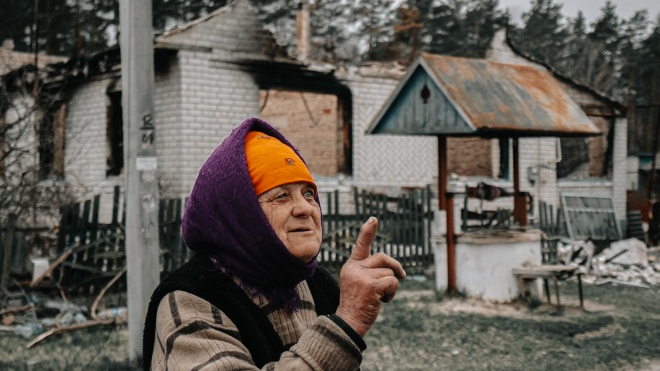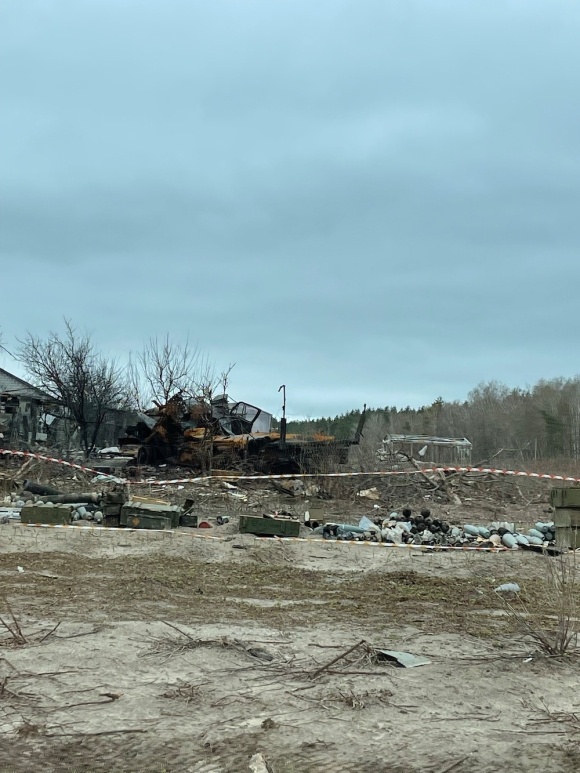At first it may seem that Yahidne (the name translates from Ukrainian as “rich in berries”) was “lucky": the houses along the road to Chernihiv are intact. But in the depths of the village there is a completely different picture — destroyed buildings, some estates are ruined to the ground. Some houses were destroyed by the Russians before they even came to the village — Yahidne was shelled with artillery. The surviving houses were also unlucky: according to locals, the Russian army divisions active in this area chose Yahidne as their headquarters.
Near the local house of culture, which is now completely destroyed, the occupiers set up an ammunition depot with thousands of bullets, shells and mines — some still unexploded. In one of the counterattacks, the Ukrainian Armed Forces hit the depot, some of the ammunition flew around the village and hit houses.
Valentyna, a 72-year-old local woman who calls herself baba Valya, does not complain. “I was so happy when our people came,” she says. Baba Valya is short, but full of energy. She gestures actively and tells everything in detail. She lived in Yahidne for more than 40 years. There was no talk of leaving the village — the occupiers blocked it in the first days of the war. Valentynaʼs house survived the occupation, but the summer kitchen burned down, and the fence around the house is now broken. "They knocked it out when they drove into the yard in a crocodile-like car," baba Valya explains.
Fences are broken in dozens of households: the Russians drove to the yards to hide the equipment. Near some of the buildings there are still burned trucks and military vehicles. Between the houses — excavated earthworks, the territory around the local school is scarred with trenches and ditches for tanks and other heavy equipment. The Russians planned to stay here for a long time, turning Yahidne into a fortress. And the residents were taken hostage.
At first, the peasants hid from the shelling in their cellars, but when the occupiers entered the village, the locals were all moved to one place — the school basement. Ivan Petrovych, or as he is called by his children, grandfather Ivan, took me there.
The school basement consists of a few relatively small rooms and a corridor. Thatʼs where locals were forced to live. Older people, children of only a few months old, youngsters — everyone. “At night you sleep on a chair and donʼt even move much — you can step on someoneʼs arm or leg, as thereʼs always someone is sleeping on the floor under you,” — says grandfather Ivan.
As a result of people sitting all the time and almost not moving, foot diseases started developing. The Russians allowed locals to go to the toilet only twice a day, and — occasionally — for a walk.
It wasnʼt cold in the basement. On the contrary a small room with hundreds of people and no ventilation. There was no natural light in the basement, batteries and generators were used — the occupants allowed locals to have them. Russians also organized a field kitchen for the peasants so that they could prepare food for themselves. Several men and women were let out into the street, where they cooked something like soup in huge cauldrons. One could not even think about the variety of products.
“You can imagine: people are crying, moaning, there is no space, and all you can do is wait for the unknown. And they [Russians] also shoot around,” — Ivan describes the feeling. Not everyone was able to withstand this reality: 11 people died simply because of unbearable conditions.
Almost no one was allowed to leave, even mothers with small children. In the first days, the Russians removed the car batteries and punctured the tires. Green corridors and evacuation flights have not been heard of here.
The Russians felt like masters in the village. They went from house to house, plundering every little thing they could get their hands on. Baba Valya says that many things were taken away from her as well.
“My husbandʼs jacket, two blankets. The whole house was turned over,” — the woman lists. — “Letʼs go, Iʼd better just show you.”
She invites us into the house and it becomes uneasy: the occupiers turned the house upside down, shook every shelf and bed, chopped down the door. What they could not take away, they gutted. A modest but clean house was turned into chaos.
Russian soldiers were drinking alcohol constantly.
“They learned just one phrase: "Is there any moonshine?" — and went around the village searching for a drink,” — the woman recalls.
According to locals, the Buryats, whom the villagers describe as contemptuously as possible, drank especially heavily. Bottles of vodka and wine are still scattered around Yahidne.
The way Russians managed their stay is surprising: they cooked food in one room and went to the toilet next door.
“They were afraid to leave the houses at night, so they used to shit three meters from where they slept,” — grandfather Ivan says.
In late March, the Russians left the village. The imprisoned locals did not know this, so they sat in the basement for another day. When they finally went out on April 1, the village was already liberated, and the Ukrainian Army entered. Baba Valya tells without stopping how the military helped her.
“Our soldiers, I thank them very much, sealed all my windows. As they were knocked out [by the blasts], you know.”
Then doctors came to the village — they checked localsʼ health and gave medicines. “Volunteers brought food, so we are not hungry here. And today they also brought a washing powder. Yesterday they helped me to hang ropes so that I could dry things there,” Valentyna lists. And then says to us: “Children, arenʼt you hungry? Let me feed you!”
Gas supply has already been restored in the village, and the authorities promise to return the electricity soon.
Itʼs still dangerous in Yahidne: there are still Russian ammunition that can detonate, mines and streamers. “Only in my garden the sappers found two,” grandfather Ivan says. “Also itʼs not possible to go into the forest, yesterday there ran a wild boar or a dog at night and exploded on a mine.”
During the month of stay, Russian soldiers, according to locals, have killed nearly two dozen civilians.
🙏 Support Babel: donate in hryvnia 🔸 in cryptocurrency 🔸 PayPal

